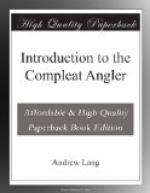’More observations of this nature, and inferences from them, might be made to gain the relation a firmer belief; but I forbear: lest I, that intended to be but a relator, may be thought to be an engaged person for the proving what was related to me, . . . by one who had it from Dr. Donne.’
Walpole was no Boswell; worthy Boswell would have cross-examined Dr. Donne himself.
Of dreams he writes:—
’Common dreams are but a senseless paraphrase on our waking thoughts, or of the business of the day past, or are the result of our over engaged affections when we betake ourselves to rest.’ . . . Yet ’Almighty God (though the causes of dreams be often unknown) hath even in these latter times also, by a certain illumination of the soul in sleep, discovered many things that human wisdom could not foresee.’
Walton is often charged with superstition, and the enlightened editor of the eighteenth century excised all the scene of Mrs. Donne’s wraith as too absurd. But Walton is a very fair witness. Donne, a man of imagination, was, he tells us, in a perturbed anxiety about Mrs. Donne. The event was after dinner. The story is, by Walton’s admission, at second hand. Thus, in the language of the learned in such matters, the tale is ‘not evidential.’ Walton explains it, if true, as a result of ’sympathy of souls’—what is now called telepathy. But he is content that every man should have his own opinion. In the same way he writes of the seers in the Wotton family: ’God did seem to speak to many of this family’ (the Wottons) ‘in dreams,’ and Thomas Wotton’s dreams ’did usually prove true, both in foretelling things to come, and discovering things past.’ Thus he dreamed that five townsmen and poor scholars were robbing the University chest at Oxford. He mentioned this in a letter to his son at Oxford, and the letter, arriving just after the robbery, led to the discovery of the culprits. Yet Walton states the causes and nature of dreams in general with perfect sobriety and clearness. His tales of this sort were much to Johnson’s mind, as to Southey’s. But Walton cannot fairly be called ‘superstitious,’ granting the age in which he lived. Visions like Dr. Donne’s still excite curious comment.
To that cruel superstition of his age, witchcraft, I think there is no allusion in Walton. Almost as uncanny, however, is his account of Donne’s preparation for death
’Several charcoal fires being first made in his large study, he brought with him into that place his winding-sheet in his hand, and having put off all his clothes, had this sheet put on him, and so tied with knots at his head and feet, and his hands so placed as dead bodies are usually fitted, to be shrouded and put into their coffin or grave. Upon this urn he thus stood, with his eyes shut, and with so much of the sheet turned aside as might show his lean, pale, and death- like




